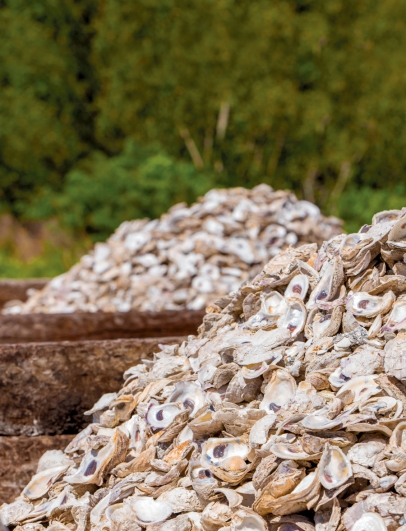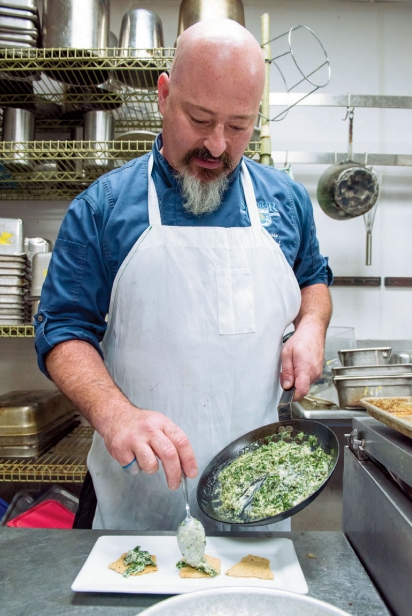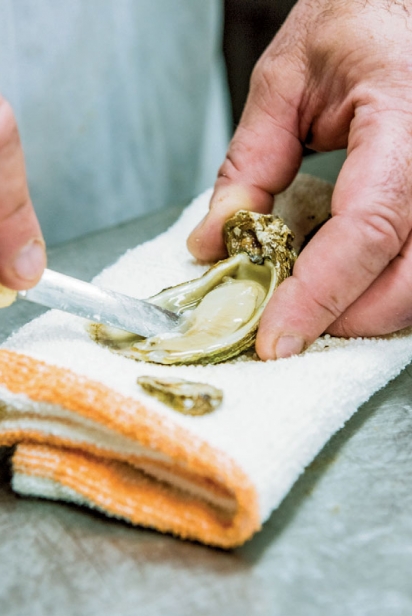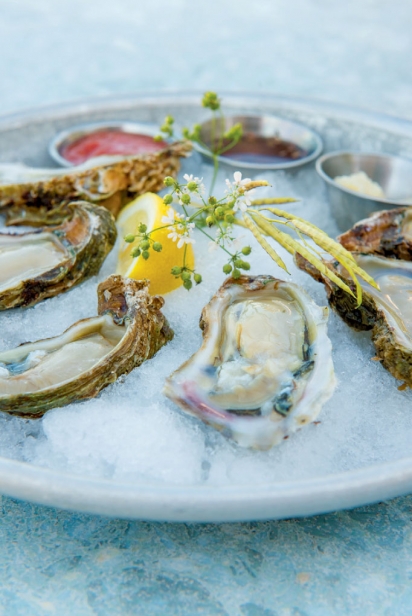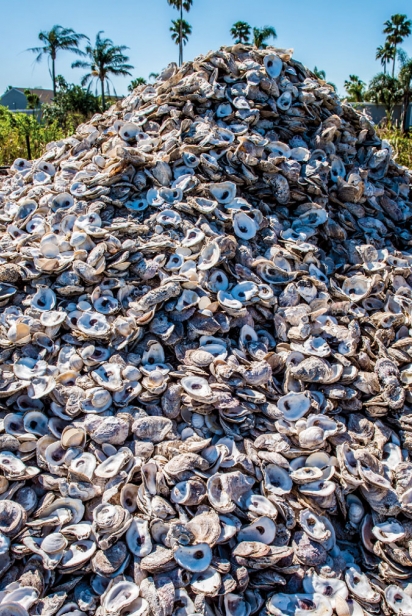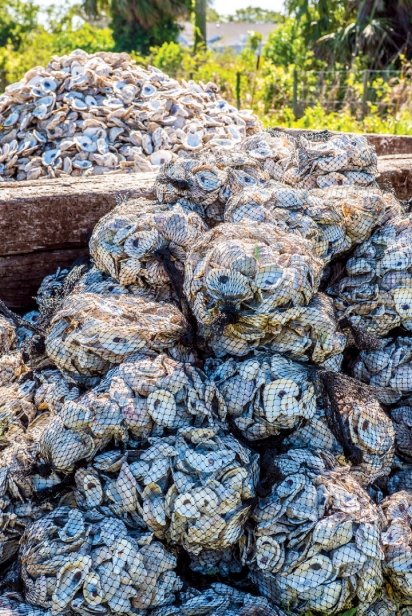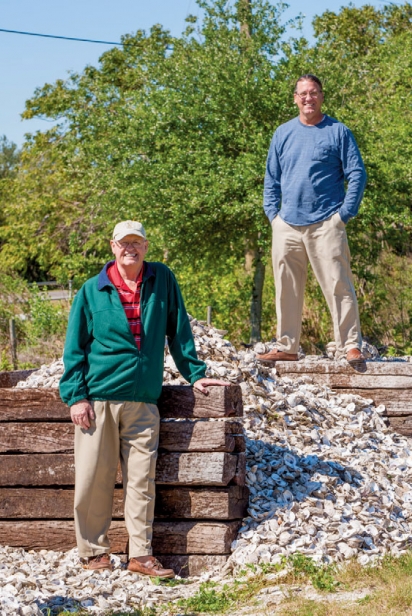Shells and Sweat
Gulf Coast Oyster Recycling and Renewal
If you were to stand at the mouth of the Manatee River and gaze north up into Tampa Bay, you’d be looking out over miles of oyster fields. That is, if you were standing there 60 years ago.
“There’s a controversial number of how much shell and oysters were harvested out of the bay—it’s in the millions of tons—that were used for road base,” says Robert Baugh, chief operating officer of the Chiles Restaurant Group. “So, they just dug all the stuff out and destroyed the ecosystem.”
Humans have been obsessed with these bivalves for at least a couple thousand years. By now the story is all too familiar: Our species has grown more and more efficient at harvesting oysters, whether for infrastructure or appetizer. We’re talking about an organism that takes a minimum of two years to reach maturity; pitted against an unchecked human appetite, the oyster population doesn’t stand a chance of keeping up.
When oyster reefs disappear, shorelines start to erode without the shell banks’ protection. Clear waters grow murky without the filtration powers of these underwater vacuum cleaners, each capable of cleaning up to 50 gallons of water per day. Clams and scallops that thrive in the shallow, sandy bottoms of the estuary lose their favorite home. And not only do oyster larvae prefer to attach and grow on oyster reefs, but the complex structures create habitats for small marine creatures—worms, shrimp, and fingerling fish—which, of course, attract the bigger hunters, many of which are also prized as people food. Take away the oysters, and their companions follow.
In a restaurant culture that prides itself on serving the finest and freshest catches from local waters, that’s a big problem. That’s when you call all hands on deck to build a solution equal in scale. A massive collaboration launched in early 2017, when the Chiles Restaurant Group joined forces with Solutions To Avoid Red Tide (START), the Manatee County Parks and Natural Resources division, the University of Florida UF/IFAS Extension, and the Gulf Shellfish Institute (GSI). Together these commercial, nonprofit, and government entities implemented the Gulf Coast Oyster Recycling and Renewal (GCORR) project.
The three sisters of the Chiles Restaurant Group—Sandbar, Mar Vista, and Beach House—stopped throwing away their oyster and clam shells. START procured a $5,000 grant from the Tampa Bay Estuary Program and put it toward the purchase of storage bins and a transportation trailer. Out in Perico Preserve, Parks and Natural Resources employees constructed a staging area, and mobilized a squadron of volunteers to bag shells, cleaned by the restaurants and cured by the elements of sun and rain.
Baugh himself is an integral part of the volunteer force that continues to fuel the project beyond its successful first year. Up to three times per week, Baugh hauls the GCORR trailer to each Chiles Group restaurant to collect the shell bins. Sometimes his oldest son lends a hand; together they cart anywhere from 500 to 1,400 pounds of cast-offs from the kitchens, then pile them high at the Perico staging grounds.
“I see the value,” Baugh says of this backbreaking task. “I’ve seen it work up in the Carolinas. We wanted to show that we’d have less going into our dumpster, which means less in the landfill. It’s very measurable.” Very measurable, indeed: About 24 tons of shell have been dedicated to GCORR’s recycled oyster reefs since Baugh’s first pick-up last August.
Elsewhere in Florida, the most common method of building new oyster reefs is to mine fossilized oyster from the middle of the state.
The GCORR solution’s sustainability impact is thereby a triple-whammy: It restores natural marine habitat, reduces landfill waste, and it doesn’t scar the land. What’s more, recycled reefs may out-perform fossilized ones. After placing them in strategic locations throughout Robinson Preserve, GSI scientists monitored their development. Their reports from the pilot year showed the live shell base produced 19% more new oysters than fossilized shells.
Back at the Sandbar, Executive Chef Rich Demarse works with staff on an individual basis to make the extra work of reserving, cleaning, and storing shells a meaningful process. He encourages them to participate in a volunteer day, shadow Baugh on a shell dump, or best of all, take a hike through Robinson Preserve.
Demarse says, “If they go to Robinson Preserve, walk around, and see bags of oysters in the water forming an artificial barrier—when they connect that way, they become more empowered to really go out of their way and make sure it’s being done right.”
Hats off to every link in this grassroots movement, which starts with a platter of oysters on ice, served up the way Chef Demarse knows is best: simple, with lemon, horseradish, cocktail sauce, and mignonette. So if you enjoy delights on the halfshell at one of the Chiles Group eateries, go on and give yourself a pat on the back for your contribution to environmental restoration.
SUPPORT OYSTER REEF RESTORATION ON EARTH DAY 2018!
Solutions To Avoid Red Tide (START) cordially invites you to join their Earth Day Culinary Celebration to benefit the ongoing Gulf Coast Oyster Recycling and Renewal (GCORR) project. The Sandbar, Beach House and Mar Vista Restaurants will also be there, doing what they do best: serving up delicious local, sustainable seafood selections and tropical libations. Attendees will be eligible to win a special door prize and can bid on exclusive silent auction items featuring Anna Maria Island products, gourmet meals, and vacation opportunities. Proceeds from this celebration will help support the GCORR program through 2018 and beyond.
See you there!
When: April 22, 2018 – 5-7 p.m.
Where: The Studio at Gulf and Pine on Anna Maria Island: 10101 Gulf Drive, Anna Maria
Tickets: $30 per person. To purchase, www.start1.org/earth-day


